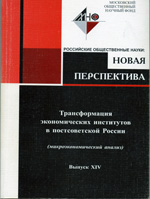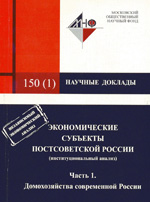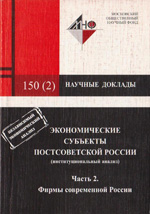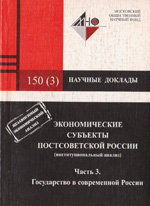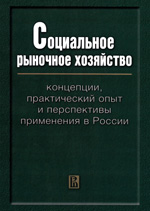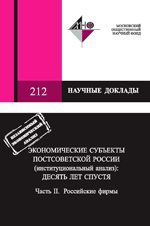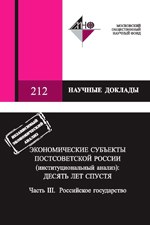
Virtual Workshop: search for efficient institutions for Russian in the 21st Century. The Workshop was founded in 1999. The project combined the efforts made by economists and sociologists from various Russian cities and some neighbouring countries: Astana, Biysk, Donetsk, Kiev, Dnepropetrovsk, Yekaterinburg, Karaganda, Kemerovo, Krasnodar, Minsk, Moscow, Nizhny Novgorod, Novosibirsk, Rostov-on-Don, Saint Petersburg, Ulan Bator, Ulan-Ude, Ulyanovsk, Kharkiv, Cherkassy, and others.
The Center is headed by a tenured professor of the HSE R. Nureev; the leading researchers are S. Avdasheva, A. Alexeev, S. Barsukova, V, Volchik, V, Dementiev, S. Kirdina, Yu. Latov, S. Levin, G. Litvintseva, M. Malkina, A. Oleynik, I. Rozmainsky, T. Sidorina, and S. Shulgin.
The Virtual Workshop holds regular online conferences at the Economics, Sociology, Management Federal Portal (http://www.ecsocman.edu.ru/forums.html); a series of monographs based on the materials of those conferences have been released. In 2001, the Workshop released the monograph titled Economic Entities of the Post-Soviet Russia (Institutional Analysis) (http://www.ecsocman.edu.ru/db/msg/47998.html) and, in 2003, it was updated and re-released in a 3-volume edition (http://www.ecsocman.edu.ru/db/msg/47998.html). Starting from 2006, the HSE issues the series titled Economic Theory: Traditions and Modern Times. The monographs titled The Great Transformation by Karl Polanyi: Past, Present, Future and Social Market Economy: Concepts, Practical Experience and Application Prospects in the modern Russia were released as parts of the series.
| Transformation of economical institutions in Post-Soviet Russia (microeconomical analysis).
Моscow, МPSF, 2000 (scientific editor and со-author), (304 p.). |
||
|
|
Economic Subjects in Post-Soviet Russia (Institutional analysis).
М.: МPSF, 1-st ed., 2001(chief-editor and co-author), (804p.) and 2-nd ed., 2003, in 3 volumes: vol.1(320 p.), vol.2(350 p.), vol.3(304 p.). |
|
|
|
The Great Transformation by Karl Polanyi: Past, Present, Future
Moscow, 2006 |
|
|
|
Social Market Economy: Concepts, Practical Experience and Application Prospects in the modern Russia
Moscow, 2007 |
Download |
|
|
ECONOMIC AGENTS OF POST-SOVIET RUSSIA (institutional analysis): TEN YEARS LATER
М.: МPSF, 2010 The given collective monograph is project continuation “Virtual workshops in social studies” which has begun in the late nineties under the aegis of the Moscow Public Scientific Foundation (MPSF). During realization of the given project under the direction of Dr.sc.oec. Prof. R.M. Nureev it was generated problem- focused scientific network community of economists and sociologists from different cities of Russia, from Moscow to Biisk. This community was consolidated on the basis of problems studying of Post-Soviet Russia by means of institutional economy methods. Economists for this purpose participating in the project and sociologists have concentrated the attention to those “game rules” on which there lived Russians of 1990th. General idea on which basis that monograph was prepared, was an accurate understanding that even in Russia are created market economy bases, however in the country yet it was not possible to create effective national model of economy. Work on that monograph was the original form of summarizing of a “Yeltsin” epoch of development of Post-Soviet Russia. Two editions of the collective monograph “Economic agents of Post-Soviet Russia (institutional analysis)” (2001; 2003) became result of work of group of social scientists, and also articles in many leading Russian and foreign journals. |
Download |
The Virtual Workshop development resulted in establishment of the International Association for Institutional Studies (IAIS). Starting from 2006, the Association issues a yearbook titled The Post-Soviet Institutionalism, and since 2009 – the Journal on Institutional Studies (http://www.instud.org). The Association also holds annual conferences for its members, and several regional conferences take place every year as well (Moscow, Saint Petersburg, Donetsk, Kemerovo, Rostov-on-Don, Sochi, and others).
The main fields of the studies: institutional analysis of the economic entities of the post-Soviet Russia, public choice theory and practice, shadow economy, problems of power and property, and the history of institutionalism. Many of them lie at the junction line of economics, sociology and political science.
In 2010, the Association released the 3-volume monograph titled Economic Entities of the Post-Soviet Russia (Institutional Analysis). 10 Years Later. The work summarizes the results of Russia’s institutional development in the course of the last decade: http://www.mpsf.org/.
The monograph is written on the basis of the 10-year work performed by the Virtual Workshop for “Searching for Efficient Ways for Russia’s Institutes in the 21st Century”. The monograph deals with the institutional analysis of the three main economic entities of the post-Soviet Russia: household, firm and state. The work introduces comparison of the periods when Russia was headed by Yeltsin and Putin; it shows the common features and the differences of those two periods.
The main attention is paid to the analysis of the new institutional space, to the mechanism through which households get adapted to the market conditions, to the ways of formation of an efficient worker and partner, and to the factors impeding accumulation of the human capital.
The monograph also presents studies of the problems that the middle class and Russia’s civil society institutes are facing in the process of their formation.
